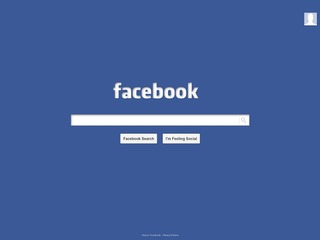
There’s one thing to release a product in the (au courant words), “minimal viable” form, and iterate. It’s another thing to release something pretty ho-hum unimpressive, especially when you’re looked up to as one of the leading innovators on the planet!
What am I referring to? Facebook’s much-anticipated and finally-launched search engine.
The reviews have been less-than-stellar, begging the question: Was Facebook compelled to show its shareholders it was still innovating and growing, therefore driving it to release a half-baked product? Seems very likely.
Let’s start with those not-so-uplifting reviews. CNN called it “promising but incomplete.”
“It’s not that the social network doesn’t have the data to turn it into a powerful recommendation tool. But for it to be more effective, Facebook would have to greatly improve how it collects information from people going forward, or expand its search powers to comb through status updates and comments,” said CNN.
TechnologyReview was also unimpressed, calling the results “mainly disappointing.”
“It might be useful to those who ‘like’ and check in at lots of places on Facebook, but that behavior hasn’t really caught on within my tiny social circle, which means that, for me, at least, Graph Search isn’t very good,” wrote Rachel Metz.
Then there is the issue of data will actually come up in Graph Search.
“While there is a perception that Facebook data is incredibly valuable, we question the quality of the Facebook data that users offer on themselves, Richard Greenfield, wrote in a report for BTIG.
“When you first sign up for Facebook, you can fill out profile data of favorite activities, movies, music, etc. For many Facebook users, especially in the US, these forms were filled out years ago and have gotten stale, as many users have not continually updated/added to this data.”
Users, Greenfield says, might “like” something either by accident, because they are entering a contest or, simply, because they want to look cool to their friends. Therefore, the data that comes up from Graph Search might noe actually be an accurate respresentation the person who comes up as a result.
Even analysts seem to have been mostly unimpressed with the feature.
Graph Search will vastly improve Facebook’s search capabilities, but that is all the more reason why the feature is something Facebook should have released years ago, Nate Elliott, an analyst at Forrester, wrote a a blog post.
“I’ve no doubt that parsing a trillion connections between a billion users is an immense challenge,” Elliott wrote. “But it’s still just site search. The big news isn’t that Facebook has fixed its search tool; the big news is that they didn’t do this long ago. For it to trumpet Graph Search as big news just looks silly. This is the kind of stuff basic, grown-up online businesses get right every day, without any fanfare.”
Elliot’s analysis: “Facebook Graph Search is important, but it’s also pretty boring.”
Doug Anmuth, analyst at JP Morgan Chase, had a more positive reaction to the idea, saying that he believes, eventually it will be able to compete with Goole, Yelp and TripAdvisor. But he also doesn’t seem to believe that revenue opportunities will be opened up in the short run.
“Graph Search may not have the near-term revenue impact of some other initiatives that the Street was looking for in Tuesday’s announcement, but we think it makes Facebook’s data far more useful by giving it greater shelf life and surface-ability, which should deepen engagement on the site. Increased monetization is likely to follow. We reiterate our Overweight rating on Facebook shares.”
Ultimately, if Facebook rolled out its product early just to appease the market, then that strategy doesn’t seem to have worked.
When Facebook first announced the news about Graph Search on Tuesday, its stock was trading at $30.98 a share. It ended Tuesday down over 3%, below $30. The stock ended the week trading at $29.66 a share.
It is currently up 1.38% on Friday, trading at $31.50 a share.
Why release it now?
So, overall, no one seems to be very impressed with Graph Search. So why did Facebook decide to release a product that seems to have come out too early?
There are a few reasons why this may have happened:
- Facebook is a public company
The first question to ask is: what has changed recently for the company? And the obvious answer to that is that it went public last year.
Given that Facebook is now a public company, it now has investors that it needs to appease, both by showing them it can make money and by showing them that it is a company worth putting money into. And part of keeping investors interested is showing that the company can still be innovative.
When a company goes public, it can sometimes be forced to do things that it may not be ready to do. Because the market wants it to grow faster, though, some companies think in the short term in order to show growth.
In a recent interview with me, Evernote CEO Phil Libin said to me that there has been a struggle between the public markets and the technology companies. Technology companies have to take long-term views, years ahead in some cases, while the markets react to things within seconds, buying and selling based on rumors.
- Getting back to its roots
Another reason for Facebook to finally go ahead with this idea also ties back to it needing to innovate, but that does not only apply for stockholders. It also contributes to the public perception about the company.
This was Facebook’s way of getting back to its roots, Chris Winfield, co-Founder and CMO of BlueGlass Interactive, said to me in an interview. He noted that the rollout for Graph Search was different from past events, as it was a smaller and that it had no live stream.
Facebook is purposely not getting people hyped up about the product, Winfield said.
Indeed, the rollout for Graph Search will be slow. The search engine is only available in English right now, and only a small amount of Facebook content is available to be searched for, including people, places, interests and photos. Posts and Open Graph actions, such as songs that people listened to on Spotify, can’t be searched yet, but will be available in the next few months.
“They want to be looked at as an innovative, young, scrappy company, not a big bloated one,” he said, which is what happened once the company went public
Of course, Facebook is now a public company, with shareholders to appease, it can’t ever really go back to being what it once was, Winfield said. However, the company still wants to change the perception that has been out there about it since its IPO last May.
- It finally had the numbers
Of course, there could be an even simpler reason Facebook decided to go into search now: it simply was not ready before.
In September, Facebook reached one billion users last year, making it, by far, the largest social network in the world.
By reaching the billion monthly active user mark, Facebook finally was in a position to harvest all of that data into a search engine. Facebook, of course, is in a unique position to put out a product like this. By having so many people who share so much of their data, no other Internet company would be able to gather so much personal data so easily.
“Capitalizing on the data it has accrued for all these year really starts to tie it all together for Facebook,” Winfield said.
The ironic thing is, of course, that only a company with the size, scope and membership base of Facebook could do something like this, since any other social network would not have enough information to make such a search engine worthwhile. So much for getting back to its roots!
What is the lesson here?
While launching with the minimal viable product is a good thing, even if it means it’s not perfect, being dictated by the market is not. It can be a detriment to a company, causing it to release a bunch of features that aren’t ready rather than perfecting what is already in motion.
What Winfield said about Facebook wanting to get back to its roots made me think of something that Brightcove CEO Jeremy Allaire said to me in an interview in November.
Since Brightcove was profitable early on, Allaire told me that he was able to take a lot of bets, and figure out where the company fit into the market. It was able to pivot and change, and while that meant “dislocating a lot of people,” taking those bets taught him lessons that he still carries with him today.
Now that the company is bigger, and has gone public, Allaire said that he still takes bets, both large and small, but there has to be a balance between maintaining the product, and sustaining loyalty, while continue to venture out and see where else the company fits.
It seems that Facebook has now found itself in a similar position of needing to maintain its product, while also needing to be able to take some risks to push it forward. Only time will tell if Graph Search turns out to be a good bet.
(Image source: http://blogs.imediaconnection.com)





















